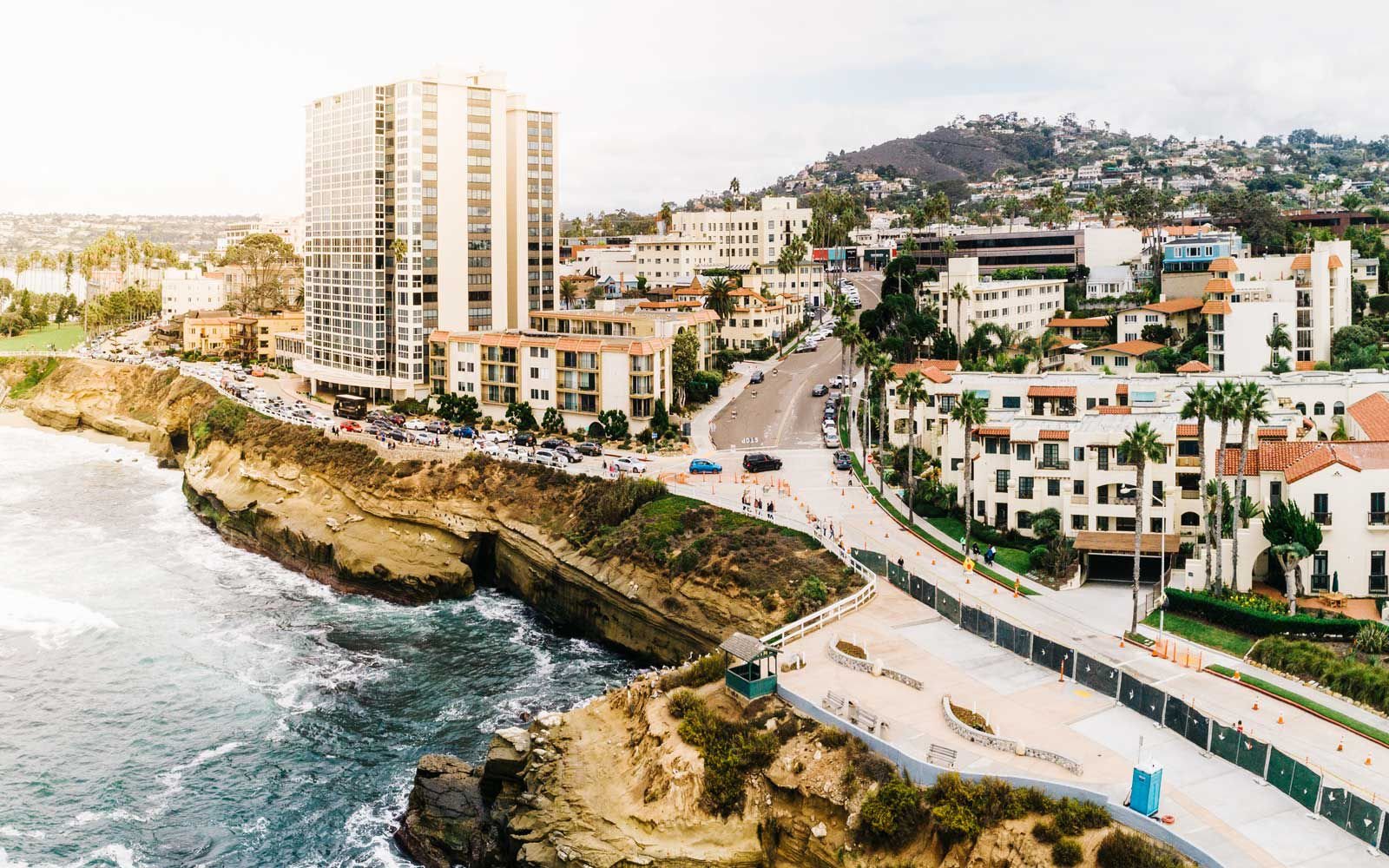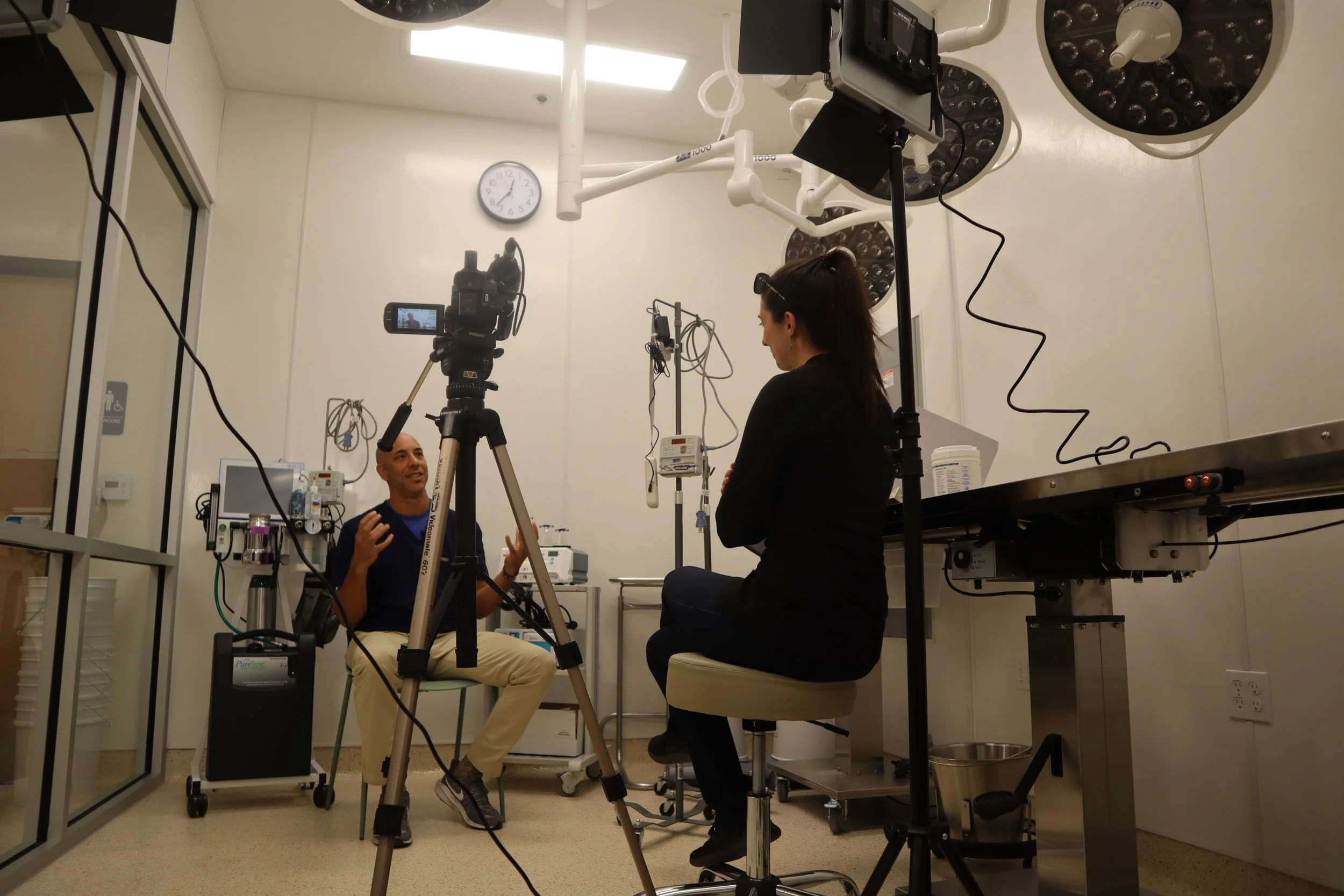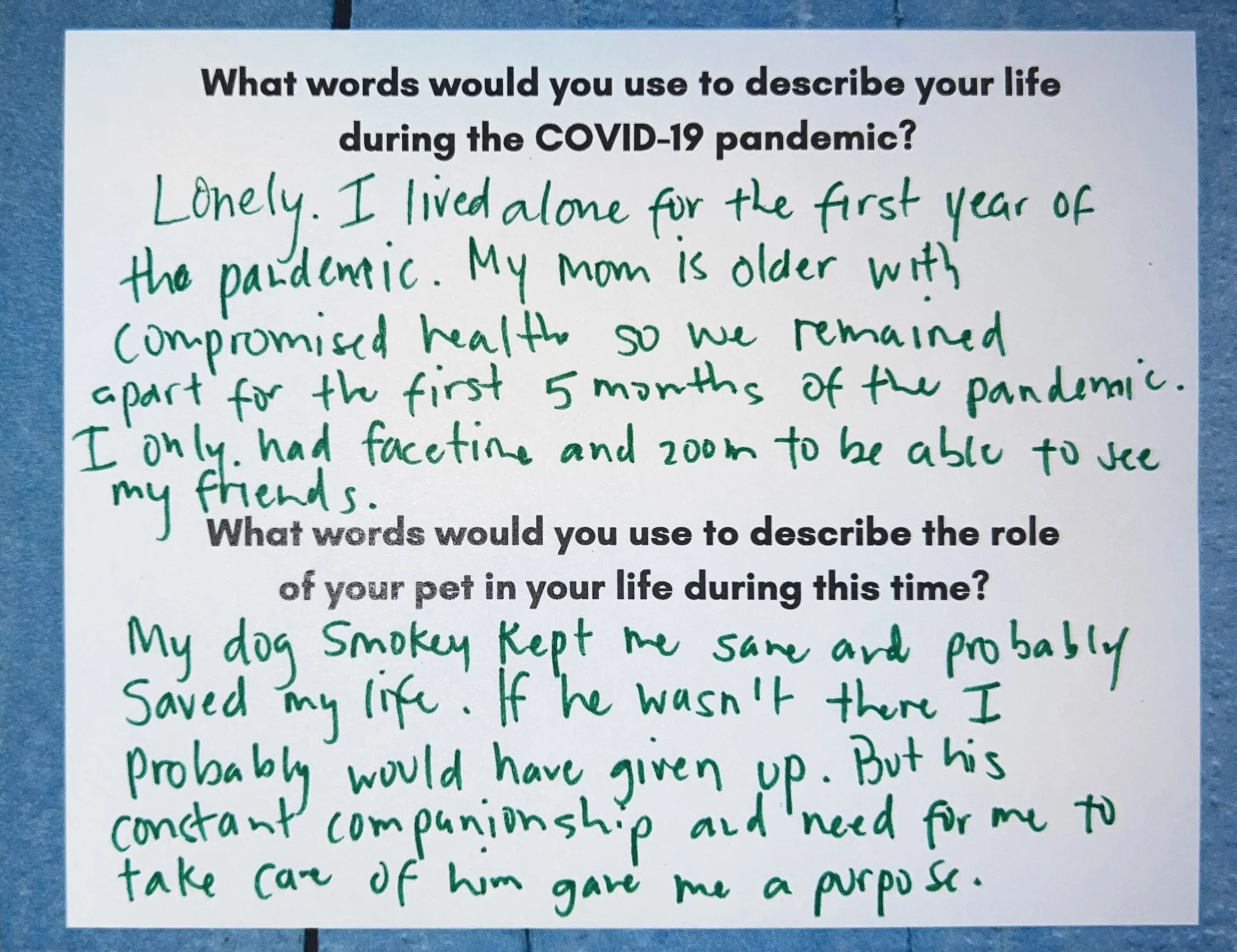SAN DIEGO | The Good Life with (and of) Pets
A collaboration with Dr. Kate (DeConinck) Gibeault, the San Diego Humane Society, and other partners
Nearly 1 in 5 American households adopted a pet during the first year of the pandemic. OurGoodLife San Diego was an oral history project that asked: What role(s) did animals play in local residents lives during the pandemic? And, how have animal companions shaped San Diegans’ imaginings of what the “good life” looks like moving forward? Our research team collected hundreds of handwritten reflections from people in different neighborhoods across San Diego about their experiences with their animals during the pandemic. We also interviewed staff members at the San Diego Humane Society, Think Dignity, PATH San Diego, and other nonprofits to learn how these organizations pivoted to meet the needs of local pet parents during a time of uncertainty, fear, and economic hardship. And, finally, we spoke with individuals experiencing housing insecurity about how they navigated the pandemic alongside their animals. Ultimately, the pandemic exemplified what scholar Donna Haraway calls the “humanimal connection,” or the ways in which humans and animals co-make each other. Questions about care, cruelty, wellbeing, and the good life cannot be framed with attention to just one species. We are learning to think more holistically about the role that animals play in human well being (and vice versa), and what it means to live a good life across species.
Religion in San Diego
Located on the traditional and unceded lands of the Kumeyaay (Diegueño) people, San Diego is a multicultural and religiously diverse city located just 20 miles from the border with Mexico. The city is also known for its sunny weather, beautiful beaches, pet-friendly restaurants and dog parks, and the world-famous San Diego Zoo. The city was named after Mission San Diego, which was established in 1769 as a part of 21 missions along the California coast. The Kumeyayy continue to live in their homelands, along with other California Indian people and Native peoples from other parts of the continent, including Indigenous migrants from south of the US-Mexico border.
The GLP - San Diego Archive
As part of the Our Good Life Project in San Diego, our team collected hundreds of handwritten (or hand-drawn) reflections about local residents’ relationships with their animal companions during the pandemic, many of which were accompanied by photos. We also conducted oral history interviews with individuals working in social services and other fields to learn how they supported both humans and their pets during this time. The full collection of images, audio, and other materials is available in the OurGoodLife San Diego Project Archive. We encourage you—and, if you are an educator, your students—to explore the archive!

Suggested Readings & Resources
Aaron Gross, The Question of the Animal and Religion: Theoretical Stakes, Practical Implications (New York: Columbia University Press, 2015).
Aaron Gross and Anne Vallely (eds.), Animals and the Human Imagination: A Companion to Animal Studies (New York: Columbia University Press, 2012).
Donna Haraway, When Species Meet (Minneapolis: University of Minnesota Press, 2007).
Leslie Irvine, My Dog Always Eats First: Homeless People & Their Animals (Boulder, Colorado: Lynne Rienner Publishers, 2016).
Meet the Team
Keene State College, Director of the Cohen Institute for Holocaust and Genocide Studies
Dr. Kate (DeConinck) Gibeault is trained as an anthropologist of religion with expertise in religion in the wake of mass atrocities. Her first major research project investigated meaning-making and framings of religion in lower Manhattan after 9/11. Trained in trauma-informed practices, Kate has gone on to work on other projects that center the experiences of individuals and communities that have endured life-shattering events. Some of her other areas of interest include: material culture, storytelling and ritualization, memorialization and memory, world religions and interfaith studies, and more. From 2019-2022, Kate served as a co-founder and co-director of the Urgent Challenges Collective, an initiative at the University of San Diego that promotes research, teaching, and advocacy work on homelessness and housing affordability. Photo credit: Hannah Schroeder / Keene Sentinel
@kateyanina (Twitter)
Dr. Kate (DeConinck) Gibeault
-
Sophia Rodriguez
Research Assistant
Sophia Rodriguez earned her MA in Clinical Mental Health Counseling from the University of San Diego in May 2022. Sophia plans to move to San Francisco and pursue a career as a children’s therapist. She is an avid pet lover and thoroughly enjoyed her time working as the research assistant for the OurGoodLife San Diego project.
-
Emma Dapkus
Videographer and Photographer
A current resident of San Diego, Emma Dapkus is a graduate of California State University, Fullerton, with a degree in Communications and an emphasis in Journalism. In addition to her professional work as a videographer, Emma is an avid blogger and amateur film photographer. Emma is grateful to OurGoodLife San Diego for combining her love of social justice and animal activism.
-
Kevin Klein
Videographer and Photographer
Kevin Klein graduated from the University of San Diego in 2021 with a bachelor’s degree in Communications. Kevin served as the photography and videography assistant on the OurGoodLife San Diego team during the first few months of the project.

Statement of Gratitude
This project was conducted in collaboration with Dr. Kate (DeConinck) Gibeault, the San Diego Humane Society, the Urgent Challenges Collective at the University of San Diego, People Assisting the Homeless (PATH) San Diego, Think Dignity, the Street Vet, and other members of our local community. In addition to those who sat with us for interviews or contributed written reflections, our team wishes to express gratitude to Kelli Schry, Sigrid Struben, Tory Rodriguez, Ian Stewart, Lisa Nunn, Mike Williams, and Karen Teel, each of whom provided significant logistical or other types of support to make this project a reality.
Our Good Life Project was seeded by Harold Morales, Rupa Pillai, and Kayla Wheeler with support from Amrita Bhandari, Ariel Mejia, Sierra Lawson, Fatima Bamba and many others from the Center for Religion and Cities’ collective.
The work is supported through generous funding from Morgan State University and the Henry Luce Foundation.
The city of San Diego is located on the traditional and unceded lands of the Kumeyaay people, who continue to live in the city. The CRC invites you to join us to learn about the Indigenous history of and contemporary context of Native groups in the lands we live and work on.






